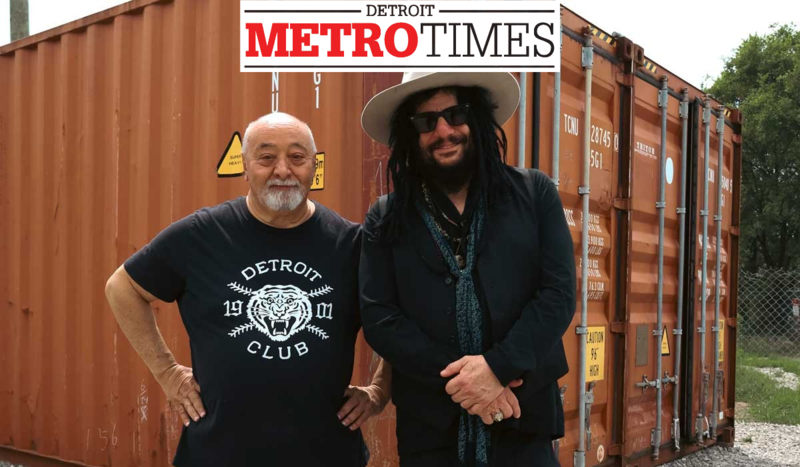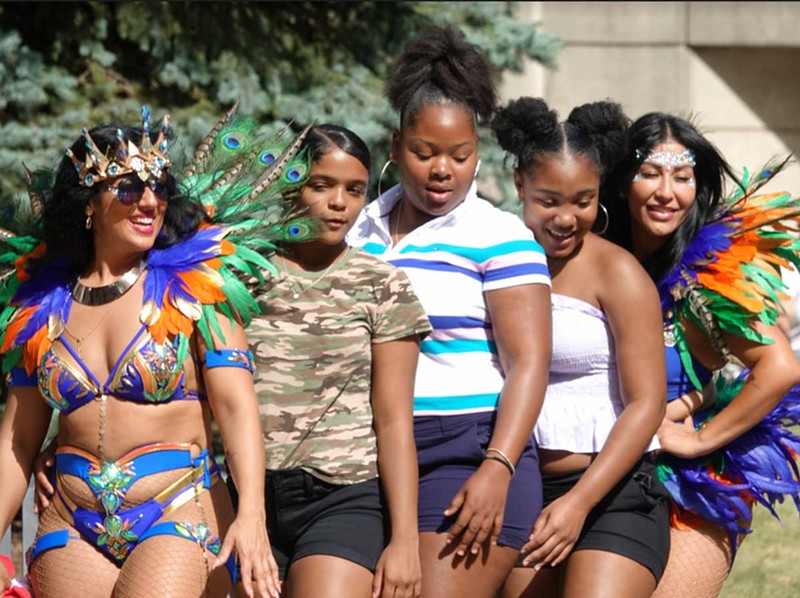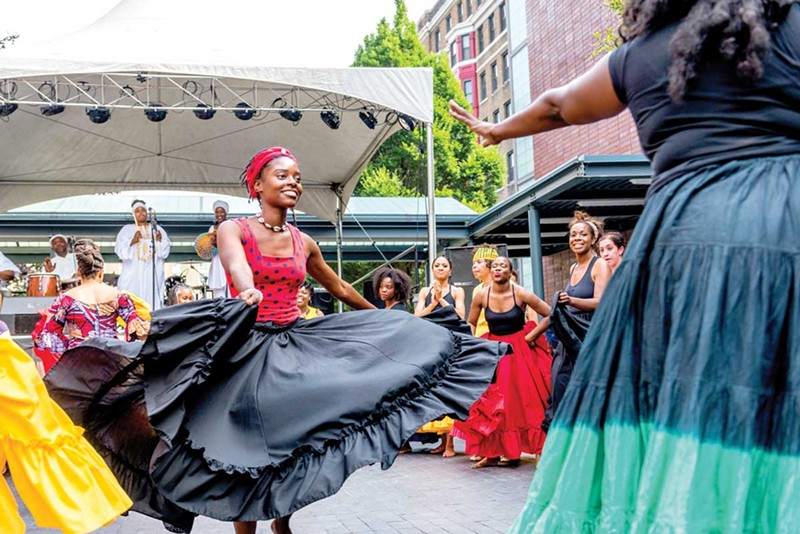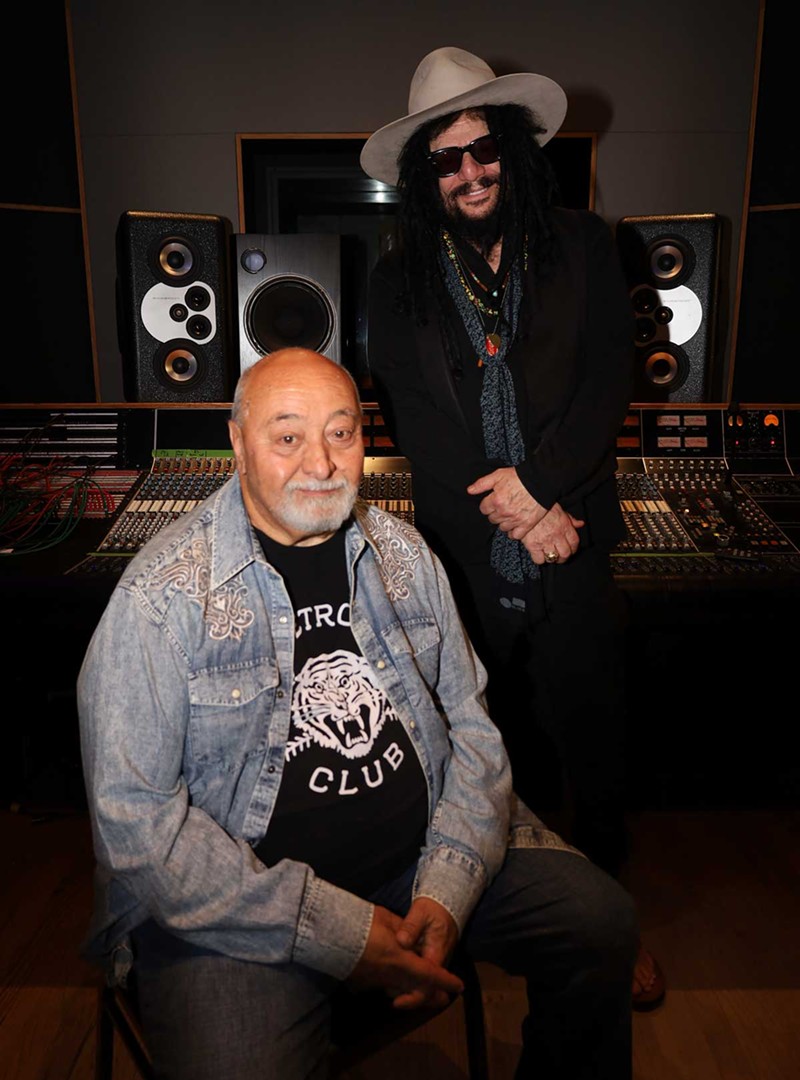
July 24, 2024
Can Detroit’s Concert of Colors help heal the world?
Originally Published: MetroTimes
Client: Concert of Colors
All we need is love
By Lee DeVito
Jul 10, 2024 at 8:00 am
One of them is Arab. The other is Jewish. Ismael Ahmed and Don Was are also dear friends, and both yearn for peace.
That’s why the theme of this year’s Don Was Detroit All-Star Revue — the musical performance Was leads as part of Detroit’s celebration of diversity, the Concert of Colors, which was founded by Ahmed — is “Peace, Love, and Understanding.”
The Revue typically serves as a way to shine a light on Detroit artists during the annual world music festival, with previous themes featuring the music of Motown or Iggy Pop. But with the growing conflict in the Middle East, Was says they decided to scrap their previous idea for a theme and focus on world peace instead.
“The guy who’s been running front of house for us and sort of coordinated all the production is named Chris Taylor,” Was explains. “He called me up and he said, ‘Why are you doing that? What we need is peace and love.’ And I just said, ‘Of course.’”
Was continues, “So all the songs touch on it. There’s nothing preachy about it. Again, no one’s taking any sides, except they’re on the side of peace and love as a method for solving big problems.”
“[Violence] is the opposite way to resolve it,” says Ahmed, who was born in Egypt.
Israel’s war against Hamas in Gaza in retaliation for its October attack and taking of dozens of hostages has killed nearly 40,000 Palestinians, many of them women and children. A missile response against Israel led by Iran in April involved more than 16 nations, stoking concerns of the violence exploding into a wider regional war.
“Without going too deep on it, I would say just on a personal level, I’m not a big fan of mixing religion and politics,” Was says. “And I see what’s happening now as being pretty much soul-crushing for everybody. I haven’t talked to anybody who’s not affected by what we’re being bombarded with. It tears everyone apart. I think any event that stresses our commonality is more essential now than ever. And that’s what [the Concert of Colors] does.”
He adds, “We know music works like that. All you have to do is go to a Willie Nelson concert, where you’ll see just a broad spectrum of people all vibing together. And that’s really what we’re going to attempt to do for my little part of it, the Detroit All-Star Revue. The theme is peace and love. … We’re just trying to bring a little comfort and relief for an hour and a half to maybe have a residual effect, and maybe it dawns on people that you can keep that effect going.”
This year’s Detroit All-Star Revue is scheduled from 8-9:30 p.m. on Sunday, July 21 at the DIA’s Detroit Film Theatre, featuring special guests Marshall Crenshaw, Steffanie Chris’tian, Milton Bennet, Herschel Boone, Carolyn Striho, Corktown Popes, Gretchen Gonzalez Davidson, Julie Benjamin, Kara Meister, and Mike E.
It’s part of six days of programming for the free, family-friendly festival, which includes happenings in and around Midtown, as well as other locations in the Detroit area like the Dequindre Cut and Dearborn’s Arab American National Museum.
“Our aim is to bring people together, not to separate [them],” Ahmed says. “That doesn’t mean that our politicians don’t do their share. You know, music is a great thing, but it is not all-powerful, and even community is not all-powerful. And so I think we’re all wishing that this gets resolved, and that there’s peace, and justice, and kindness, and respect for everybody.”

30 years of promoting diversity
The Concert of Colors launched in 1993 thanks in part to New Detroit, a coalition of corporations and community organizations that were working to fight against the entrenched racial segregation in the region following the 1967 summer of civil unrest.
“[New Detroit] was sort of a Black and white organization at the time,” Ahmed says. However, in the years following 1967, the Detroit area had become home to increasing numbers of people from other cultures as well, including Arabs, Latinos, and Asians. “Metro Detroit had become much broader than that, with lots of other people of color especially,” he continues. “And the one thing that they all have in common is their cultures.”
Members of these groups had started to come together following the 1982 death of Vincent Chin, a Chinese American autoworker who was killed by two white men on the night of his bachelor party, a vicious attack that occurred amid a backdrop of anti-Asian sentiment as the Detroit auto industry struggled. An organization called the Cultural Exchange Committee began holding cultural events in Detroit’s neighborhoods and working on programs to promote entrepreneurship among minority groups.
Around that time, the city had transformed a former industrial section of the riverfront into Chene Park, now known as the Aretha Franklin Amphitheatre. The city offered the outdoor amphitheater to groups like the Cultural Exchange Committee to promote diversity. Thus, the Concert of Colors was born.
The first festival started with a budget of $100,000. Within a few years, it was drawing tens of thousands of attendees. In 2001, it expanded to three days to coincide with festivities surrounding Detroit’s tricentennial, drawing 100,000 visitors with a budget of more than $1 million and corporate and foundation support.
But by 2006, the partnership with the City of Detroit and the then-Chene Park ended. Fundraising became difficult, and even more so as Detroit fell into the Great Recession. With corporate sponsorships drying up, the Concert of Colors forged new partnerships with organizations like the Detroit Symphony Orchestra and Midtown Detroit, Inc., relocating the festival across multiple venues in Midtown all while keeping it free to attend.
The Concert of Colors has now partnered with more than 20 local arts and media organizations, “a grand coalition for progress,” as Ahmed describes it.
“Having to raise the money for this is always a struggle,” Ahmed says. “Each year, we’re not even sure if we can pull it off.” But as he likes to say, “When you don’t have money, you should have friends.”
Ahmed says the festival’s continued success is the result of the hard work of lots of generous people.
“Everybody is involved, whether you’re Black or white, or Arab, or Jew, or Asian, or Native American,” he adds. “And that’s what we want. We want people to be able to celebrate together to enjoy and respect each other’s cultures, and we want them to get to know each other so that they could work for the progress of all the people of Detroit.”

The power of music
An accomplished musician, producer, and music industry pillar originally hailing from the Detroit area, Was first performed at the Concert of Colors in 2001. He immediately fell in love.
“I’d been living in L.A., and I hadn’t been to the Concert of Colors,” Was says. “It was just the most beautiful afternoon, and it was a peculiarly Detroit mixture of people. It was a Noah’s Ark.”
Shortly after, Was and Ahmed connected over dinner, and soon found they had much in common. An idea to bring the music of Detroit into the festival was hatched.
“It was basically [an idea] to celebrate the indigenous music of Detroit every year,” Was says. “Within a couple of years, we started the Revue.”
“I think this is a bringing together of, for want of a better word, the tribes, you know, to celebrate who and what we are, and what we’ve done here in Detroit,” Ahmed says. “It’s a very Detroit thing that opens up the planet to everybody.”
Aside from the All-Star Revue, this year’s Concert of Colors will also feature a tribute to the MC5, the Detroit rock band that helped define the counterculture era of the 1960s and ’70s. The MC5’s last surviving members, guitarist Wayne Kramer and drummer Dennis Thompson, both died earlier this year, as did the band’s visionary manager John Sinclair. In a bittersweet moment, the band was finally selected for induction into the Rock and Roll Hall of Fame in October, with none of the band’s original members alive to appreciate it.
A musical tribute to MC5 will take place at the Concert of Colors on Friday, July 19, at 6:30 p.m. at the Detroit Historical Museum. The event will be hosted by WDET’s Ann Delisi, alongside journalist Peter Werbe and band photographer (and Sinclair’s former wife) Leni, with performances by Was and Tino Gross.
A case could be made that the MC5 was so far ahead of its time that the rest of the world is finally catching up. It was the only band to perform as part of the protests against the Vietnam War at the chaotic 1968 Democratic National Convention in Chicago. In an echo of history, this year’s DNC will also be held in Chicago in August, and is likely to attract a sizable protest movement opposed to the war in Gaza.
“I think that was certainly one of Sinclair’s great contributions to the culture, was that he understood that rock ’n’ roll was an important political force — a force for change,” Was says. “I don’t know that it was ever as clearly delineated previously, the whole idea of a ‘guitar army,’ which I think is John’s phrase, you know, is pretty significant. And that impacted more than just local culture.”
As for what’s in store, Was keeps details under wraps. He says his rehearsals for the Concert of Colors performances typically happen close to the event.
“I think part of the charm of it is that maybe about 60% of it gets worked out beforehand,” he says. “And the spontaneity of it is where the sport and adventure come in. I think people pick up on that. It’s part of the fun — it’s not something you’re ever going to see again. You come and you get this event and it happens one time. We dig the fact that it’s sort of being created on the spot.”
Was says that’s something he learned from touring with Grateful Dead founding member Bob Weir as part of the group the Wolf Bros.
“During the course of any Grateful Dead-related show, there’ll be a couple of absolute train wrecks, and a couple moments of pure ecstasy that make the whole endeavor worthwhile,” Was says. “And the audience comes because they know that no one knows whether it’ll be a trainwreck or ecstasy. But you’re seeing something real, and actually participating in it, because the musicians feed off of the audience. The feedback coming back impacts the next note you choose.”
“In a certain sense, that’s true of the entire Concert of Colors,” Ahmed adds. “You have a mix of performances that you will not find anyplace on planet Earth, from all over planet Earth.”
A brief overview of the many global acts scheduled to perform at the Concert of Colors include electronic artists Transglobal Underground from England, Afro Cuban jazz ensemble Big Palladium 3, the all-women North African music ensemble Nafada, and the Inuit music group Pamyua, among others.
Other activities include a Caribbean costume parade, a K-Pop dance-a-thon, African and Latin dance lessons, and a lowrider car show. There will also be an exhibit and fundraiser at the Scarab Club featuring art made by Middle East and African refugees.
“There’s always a lot of focus on the music, but there’s so much more,” Ahmed says. “There will be vendors, there will be voter registration, there will be health care information. It’s a whole thing aimed at the entire human body.”

The future of the Concert of Colors
While the festival has struggled financially over the years, the Concert of Colors recently received some good news. Last week, the State of Michigan included Concert of Colors in its 2025 budget, earmarking $1 million with a goal to book artists, hold programming in more Detroit neighborhoods, and most importantly keep the festival free to attend. Organizers say the Concert of Colors could be on track to become the largest world music festival in the nation, and draw tourists to Detroit.
Of course, the money is welcome, but for Ahmed and Was, the Concert of Colors has long been a labor of love.
“When I think back to my first exposure to the festival, the thing that really struck me is that it represented the best of the city. That’s what touched me. You see how great the people in the city are, and how unique the mixture is here. And the thing that really locked me into it was meeting Ish, who I thought combined activism and philanthropy and love of arts into one very dynamic force.”
“I love you too,” Ahmed responds.
“I love you man!” Was says. “He’s one of my closest friends. And it’s all from this common thing, the love for this that we have. I think he is just the embodiment of the spirit that makes Detroit unique and great.”
Ahmed modestly deflects the praise.
“I am not a big fan of the big leader theory, like some great leader led the civil rights movement, you know, Martin Luther King Jr. made it all happen,” he says. “People forget that thousands of people gave everything for it to be successful. In a way, Concert of Colors is like that, too. We have a whole bunch of really talented and wonderful people, whether they’re the musicians, or the people who work for nearly nothing, or nothing, and the many, many others who jump in and help out. And it’s a cross section of Detroit. In many ways, it’s a bottom-up festival by the community, for the community.”
Share This Story, Choose Your Platform!
Marx Layne is your competitive advantage.
Your reputation and success are our only concerns.
